The hidden crisis in recruitment: How keyword-matching tools are sabotaging your hiring decisions
“I did not read that CV as I could not even pronounce the name of the candidate.” This shocking admission came from a senior industry leader during a recent hiring retrospective, and the uncomfortable silence that followed revealed a truth most leaders won’t admit: human bias still plays a part in the hiring process.
The story gets worse. This same candidate was later flagged by an AI powered ATS platform as the top candidate from a pool of 438 that had applied. Acknowledging their failure due to bias, they interviewed the candidate where he introduced himself with a shorter version of his name, he ticked every box, he was hired and became their highest-performing team member within six months. The difference? AI saw capability.
At byteSpark.ai, we work closely with partners to review resume screening decisions daily, and the patterns are devastating: 91% of companies are using AI resume screening wrong, relying on primitive keyword-matching that misses exceptional talent while fast-tracking mediocre candidates who’ve gamed the system.
Gaming the system is not difficult with the primitive keyword frequency matching algorithms still being used by some of the big players. Their brand name is enough for us to think they would be using the most advanced, fair, objective and unbiased approach. A candidate can mention a keyword a few times and saturate the algorithm, causing it to rank them high. In our demos, we have shown how the most sophisticated (“claimed”) algorithm today will score a candidate as a 87% fit, but true-AI will find them completely misaligned at 23%.
Extra ordinary claims require extra ordinary evidence – heard that one before?
The consequence? In a market where the best candidates have multiple options, these companies are systematically selecting from the bottom 60% of applicant pools while their competitors using intelligent screening secure the top performers.
The Great Resume Screening Delusion: Why Most AI Tools Fail
The Fatal Flaw in Traditional AI Screening
Most recruitment teams believe they’re using “AI resume screening” when they’re actually using glorified keyword search engines. The difference is the difference between reading and understanding.
Traditional keyword-matching approach:
- Scans for specific terms, synonyms and phrases
- Counts years of experience mechanically
- Flags education credentials automatically
- Misses context, potential, and transferable skills
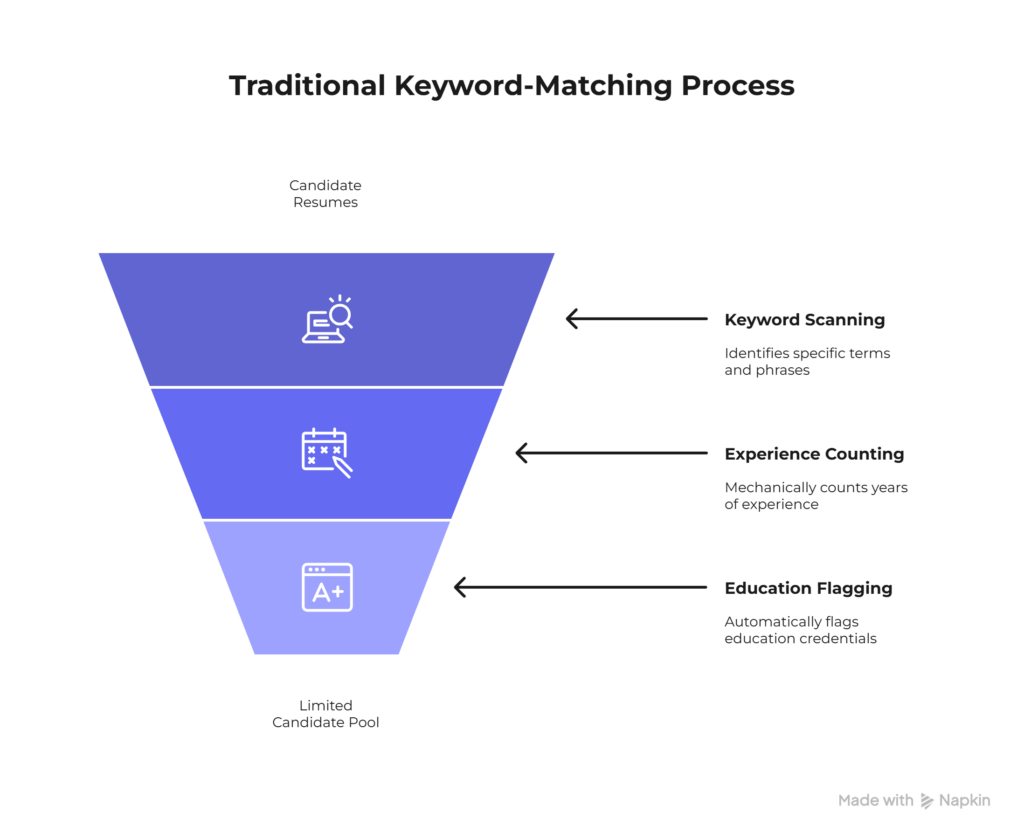
The devastating result: Exceptional candidates with non-traditional backgrounds, career pivots, or innovative experience descriptions get eliminated before human eyes ever see them.
Real example: A candidate with “software optimization” experience was rejected by keyword-matching ATS for a “performance tuning” role. The systems were identical—the terminology was different. The candidate had led optimization projects that increased system performance by 340%, but traditional AI couldn’t understand the connection.
Another example: A candidate with “Docker” or “Kubernetes” experience was rejected by keyword-matching ATS for a role requiring experience in “containerization”. Go figure? There are so many examples we have that it almost starts to get annoying.
The Human Capacity Myth
The second fundamental problem: the belief that human screening is more accurate than AI. The reality? Most recruiters can’t process 100+ CVs objectively, especially under time pressure.
Human screening limitations:
- Cognitive overload: Decision quality degrades after reviewing 20-30 resumes
- Unconscious bias: Name, education, and employment gap assumptions
- Recency effect: Later applications get less thorough evaluation
- Consistency failure: Same qualifications evaluated differently throughout the day
The compounding effect: When human limitations combine with primitive ATS pre-screening, companies create a perfect storm of talent elimination that systematically excludes their best potential hires.
The Intelligent Screening Revolution: Beyond Keywords to Context
How Contextual AI Changes Everything
The 9% of companies dominating their hiring markets have moved beyond keyword-matching to contextual AI that understands meaning, not just words. This represents a fundamental shift from pattern recognition to comprehension.
Contextual AI capabilities:
- Experience interpretation: Understanding that “customer success” and “client relations” represent similar competencies
- Skill translation: Recognizing how abilities transfer between industries and roles
- Potential assessment: Evaluating growth trajectory and learning patterns
- Cultural fit prediction: Analyzing work style and value alignment indicators
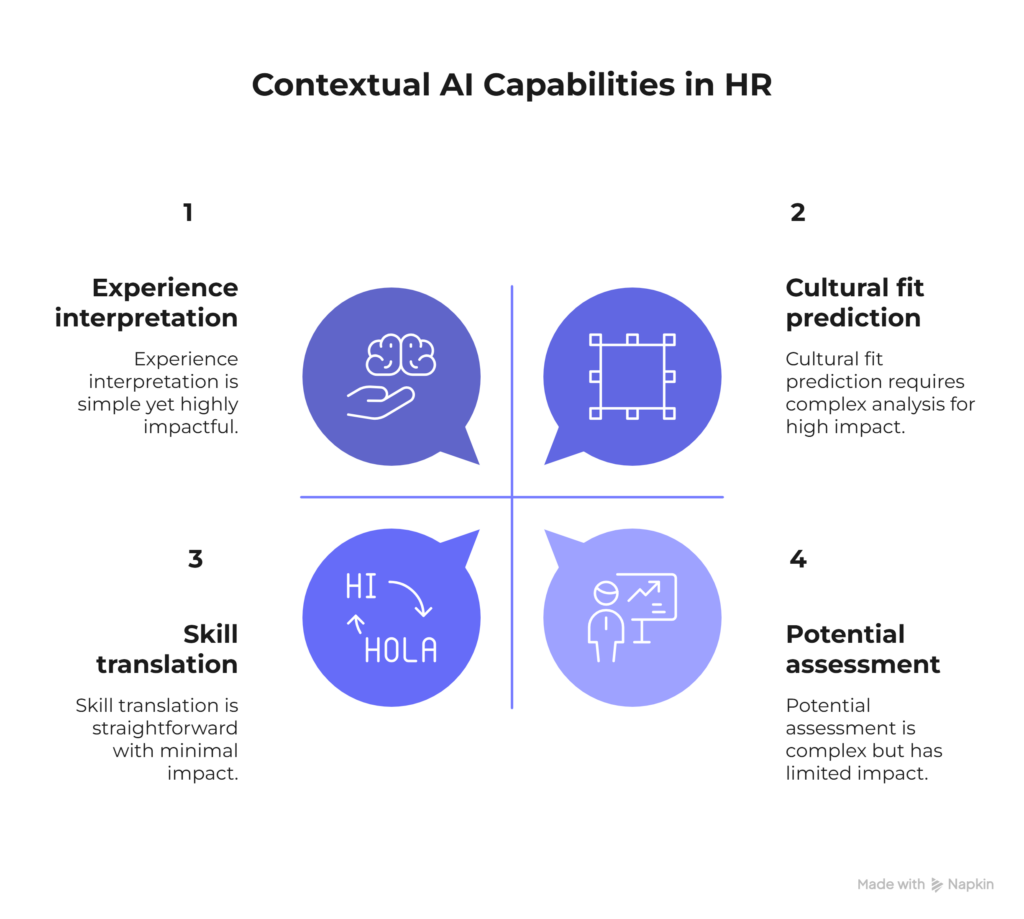
Real byteSpark.ai example: During a live session with a client user, 70 CVs arrived within 30 minutes of a cybersecurity role being posted on LinkedIn. While the hiring manager was still familiarizing herself with the platform, our AI had already identified and shortlisted 5 exceptional candidates—including one whose previous title was “Digital Risk Analyst” rather than traditional cybersecurity terminology. All 5 candidates later received interview invitations.
The Six Pillars of Intelligent Resume Screening
Pillar 1: Capability Recognition Over Keyword Matching
Traditional approach: Search for exact terms like “project management,” “Python,” or “B2B sales”
Intelligent approach: Understand the underlying capabilities and how they manifest across different contexts and terminologies.
byteSpark.ai methodology: Our contextual AI reads between the lines, assessing candidates based on how their experience aligns with role requirements, including their potential for growth and skill development.
Impact example: A candidate described their experience as “leading cross-functional initiatives to improve operational efficiency.” Traditional keyword AI missed this because it didn’t contain “project management.” Our contextual AI recognized the leadership, coordination, and process improvement skills that directly translated to project management capability.
The competitive advantage: While competitors eliminate candidates for terminology differences, intelligent screening identifies capability regardless of how it’s expressed.
Pillar 2: Bias Elimination Through Systematic Evaluation
The problem: Human screening introduces systematic bias based on names, education pedigree, employment gaps, and non-traditional career paths.
The solution: AI that screens every applicant with identical objectivity, focusing purely on capability and potential rather than demographic or background assumptions.
Real transformation: One byteSpark.ai client discovered they had been unconsciously filtering out candidates from specific universities and geographic regions. After implementing intelligent screening, their diversity metrics improved 78% while simultaneously increasing hire quality scores.
The mechanism: Our AI evaluates candidates based on demonstrated capabilities and role alignment, not proxy indicators that correlate with bias rather than performance.
Measurable outcome: The candidate initially rejected based on name bias became the top performer in his team, demonstrating how systematic bias elimination doesn’t just improve fairness—it improves business outcomes.
Pillar 3: Real-Time Transparency and Feedback
Traditional approach: Candidates disappear into “black holes” with no communication or feedback
Intelligent approach: Every candidate receives feedback—no exceptions.
The unexpected benefit: This transparency transforms employer branding in ways most companies never anticipate. One byteSpark.ai client experienced a 700+ increase in LinkedIn followers in a single week due to candidates sharing positive experiences about receiving actual feedback rather than generic rejections.
The business impact: Candidates who don’t get hired become brand ambassadors rather than detractors, creating viral positive sentiment that attracts higher-quality applicants to future roles.
Strategic advantage: While competitors create negative candidate experiences that damage their talent pipeline, intelligent screening builds reputation that compounds over time.
Pillar 4: Speed Without Accuracy Compromise
The traditional trade-off: Fast screening means surface-level evaluation; thorough screening means slow time-to-hire.
The intelligent solution: From role creation to qualified shortlist in under an hour without sacrificing evaluation quality.
Real-time demonstration: During client engagements, as byteSpark.ai, we regularly process and shortlist candidates faster than hiring managers can complete their initial platform walkthrough. Quality doesn’t decrease—it improves because AI doesn’t suffer from attention fatigue or rushing bias.
Competitive implication: While traditional companies choose between speed and quality, intelligent screening delivers both simultaneously, creating insurmountable advantages in competitive talent markets.
Pillar 5: Agency and In-House Team Transformation
For recruitment agencies: Traditional CV evaluation consumes 60-70% of recruiter time, leaving limited capacity for client relationship building and strategic hiring consultation.
The transformation: byteSpark.ai, in its recruitment services business, has given recruiters time to focus on high-value activities like candidate engagement and relationship management, client development and market intelligence.
For in-house teams: Traditional screening requires significant recruitment expertise and time investment that most internal teams lack.
The solution: Find the right AI-powered ATS, and stay away from the big guns selling automation as AI. It is not true-AI.
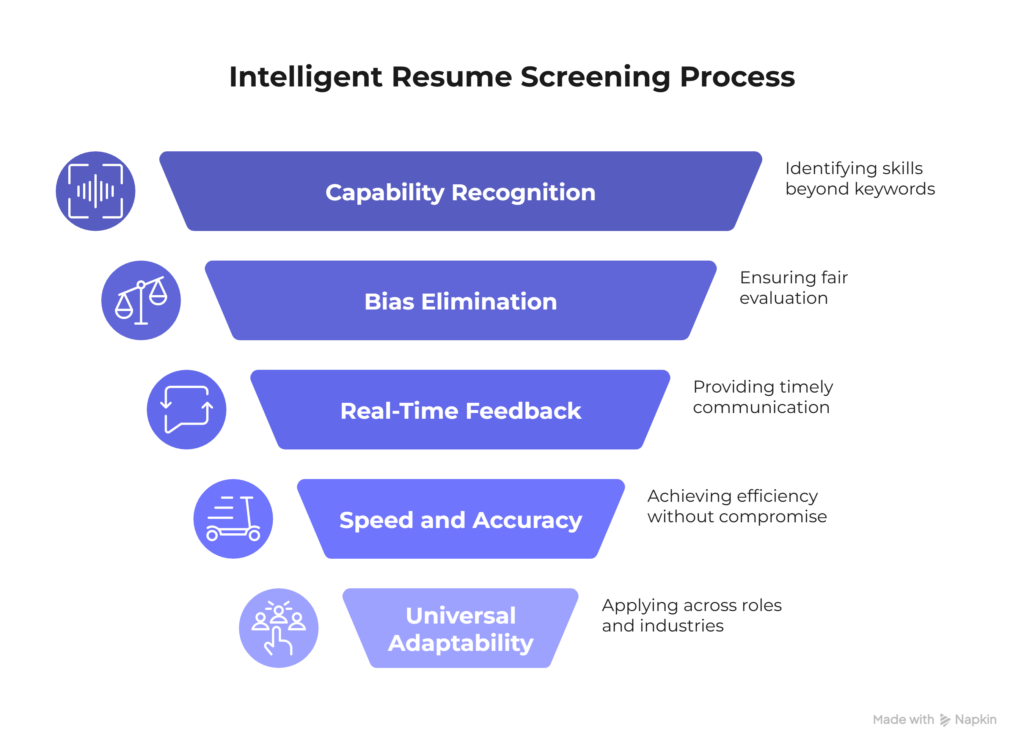
The Hidden Costs of Traditional Resume Screening
Opportunity Cost Analysis
What companies lose with keyword-matching screening:
- Top talent elimination: 34% of best candidates eliminated for terminology differences
- Bias amplification: Systematic exclusion of diverse candidates with non-traditional backgrounds
- Time waste: Recruiters spend 67% of time on administrative screening rather than strategic activities
- Brand damage: Poor candidate experience creates negative employer reputation
What companies gain with intelligent screening:
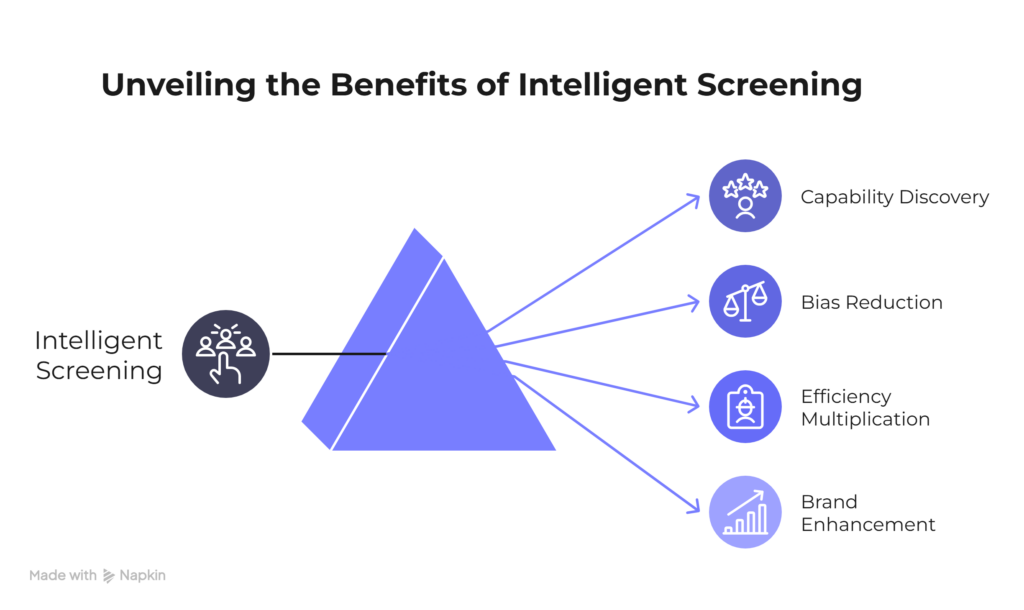
- Capability discovery: Identification of high-potential candidates missed by traditional methods
- Bias reduction: Objective evaluation that improves both fairness and business outcomes
- Efficiency multiplication: Strategic time allocation that improves both speed and quality
- Brand enhancement: Positive candidate experience that amplifies talent attraction
The Compounding Effect
Traditional screening creates negative cycles:
- Poor candidate experience → Reduced applicant quality → Harder screening decisions → More bias → Worse outcomes
Intelligent screening creates positive cycles:
- Great candidate experience → Enhanced employer brand → Higher applicant quality → Better hires → Improved business outcomes
Real measurement: byteSpark.ai clients report that improved candidate experience leads to 45% higher application rates for subsequent roles as positive word-of-mouth attracts better candidates.
Strategic Implementation Framework for AI Resume Screening
For Recruitment Agency Leaders
Current challenge: Recruiters spend most time on low-value screening activities rather than candidate relationship building and strategic client consultation.
Intelligent transformation:
- Automate CV evaluation completely with contextual AI that understands capability
- Redirect recruiter focus to client development and candidate relationship management
- Improve placement success rates through better candidate-role matching
- Scale operations without proportional staff increases
ROI measurement: Agencies report 200-300% productivity increases when recruiters focus on relationship building rather than resume screening.
For Startup Founders
Current challenge: Limited recruitment expertise and budget constraints make effective screening difficult.
Intelligent solution:
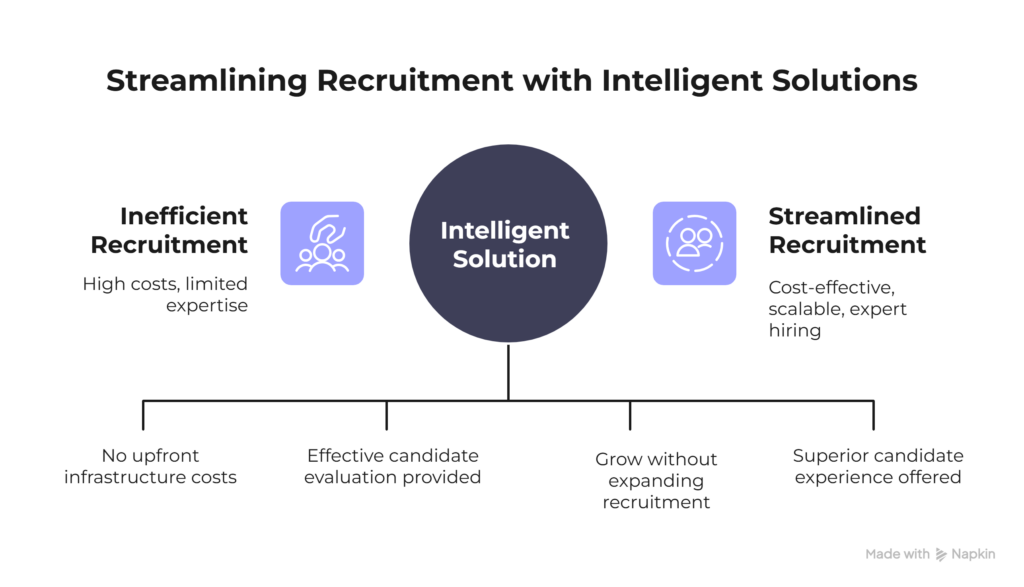
- Zero upfront investment in recruitment infrastructure
- No specialized expertise required for effective candidate evaluation
- Scale hiring as company grows without recruitment team expansion
- Compete with larger companies for top talent through superior candidate experience
Growth advantage: Startups using intelligent screening can secure talent that typically chooses larger, more established companies.
For Talent Acquisition Leaders
Current challenge: Balancing screening thoroughness with time-to-hire pressure while managing team capacity.
Strategic transformation:
- Eliminate screening bottlenecks that slow hiring cycles
- Improve hire quality through bias reduction and capability focus
- Enhance employer brand through superior candidate experience
- Demonstrate TA value through measurable improvements in hiring outcomes
Leadership positioning: TA leaders become strategic business partners rather than administrative function managers.
For HR Tech Innovators
Current challenge: Evaluating which AI screening solutions deliver genuine intelligence versus marketing promises. Avoiding the Workday debacle of ageism is on the top of everyone’s mind and a common excuse for avoiding AI. The level of guard rails an organization can implement into an AI solution should be the top priority.
Evaluation framework:
- Test contextual understanding rather than keyword matching
- Measure bias reduction through diverse candidate outcome tracking
- Assess speed without quality compromise through pilot programs
- Evaluate transparency through candidate feedback mechanisms
Innovation advantage: Early adoption of intelligent screening creates competitive advantages that compound over time.
The Future of Resume Screening: Intelligence vs. Automation
The Great Divergence
The recruitment technology market is experiencing a fundamental split between companies that automate existing processes and those that reimagine what’s possible with true intelligence.
Automation approach: Make existing screening faster Intelligence approach: Make existing screening obsolete
Market trajectory: Organizations choosing automation will find themselves competing with increasingly sophisticated intelligence-based solutions that make their approaches seem primitive.
The Network Effects of Intelligent Screening
Individual advantage: Better candidate identification and experience Organizational advantage: Enhanced employer brand and talent attraction Market advantage: Access to talent pools that competitors can’t effectively evaluate Industry advantage: Setting new standards that force competitor adaptation
The compounding effect: Early adopters of intelligent screening don’t just get better results—they make it harder for competitors to attract the same quality of talent.
What’s Coming Next
Predictive candidate matching: AI that identifies high-potential candidates before they apply Continuous talent pipeline development: Ongoing relationship building with future candidates Real-time market intelligence: Understanding talent availability and competition dynamics Integrated hiring ecosystem: Seamless connection between screening, interviewing, and onboarding
byteSpark.ai evolution: We’re already developing these capabilities for clients who want to stay ahead of the intelligence curve.
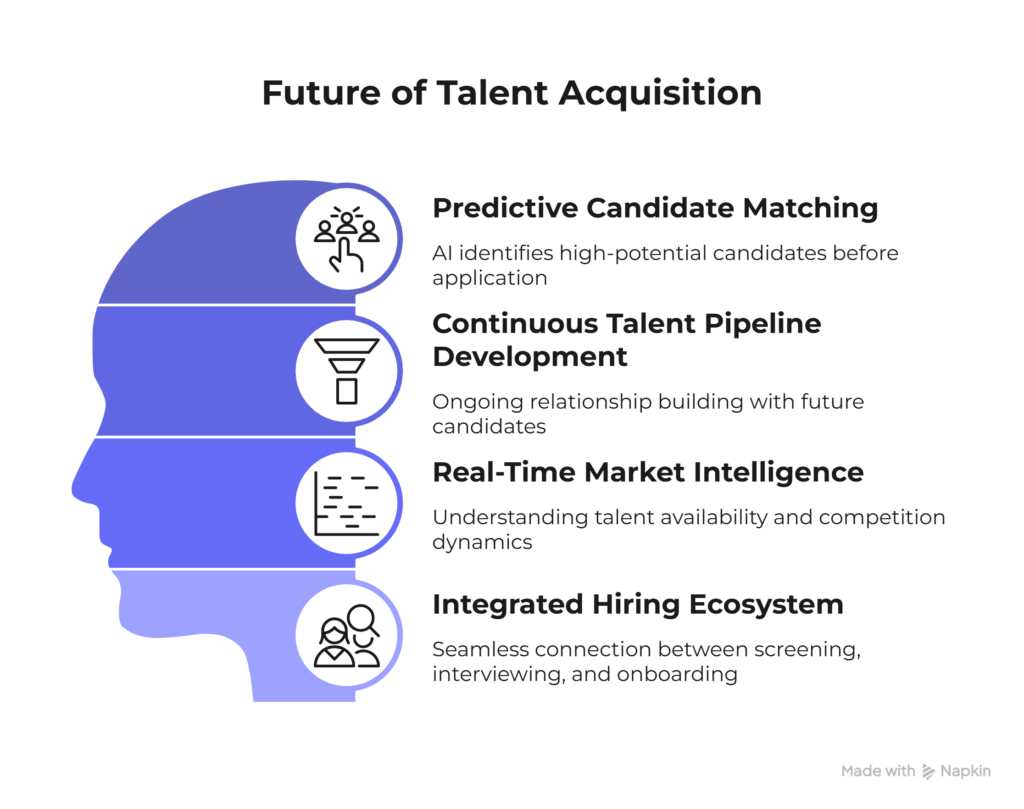
Conclusion: The Choice That Defines Your Talent Future
The resume screening revolution has already begun. The question isn’t whether AI hiring software will transform how companies evaluate candidates—it’s whether your organization will ride the wave to stay ahead by using intelligent AI hiring software that understands capability or drown in the tsunami of primitive systems that count keywords.
For forward-thinking leaders: The organizations that embrace contextual AI screening now will dominate their talent markets for the next decade. Those that continue relying on keyword-matching will find themselves increasingly unable to compete for the candidates that matter most.
For recruitment professionals: The choice is between spending your time on administrative screening tasks that AI can do better, or focusing on strategic activities that only humans can perform. Intelligent screening doesn’t replace recruiters—it elevates them.
For growing companies: In a market where top talent has multiple options, the companies with the most intelligent screening processes win. Period.
The byteSpark.ai difference: We don’t just automate resume screening—we reimagine what’s possible when AI truly understands capability rather than just recognizing keywords. The result isn’t just better hiring; it’s a competitive advantage that compounds over time.
Your next move is clear: While your competitors eliminate top talent through primitive keyword-matching, you can secure the best candidates through intelligent screening that reads between the lines.
Ready to see how contextual AI transforms your hiring decisions? Join the 9% of companies that win every recruitment battle. We have shown HR leaders how AI can revolutionize recruitment in under 30 minutes. You are welcome to get insights – if your organization qualifies.
Ping us if you want to see the byteSpark.ai solution in action | Want feedback on every candidate automatically? Join the recruitment revolution—say goodbye to keyword-matching for good






